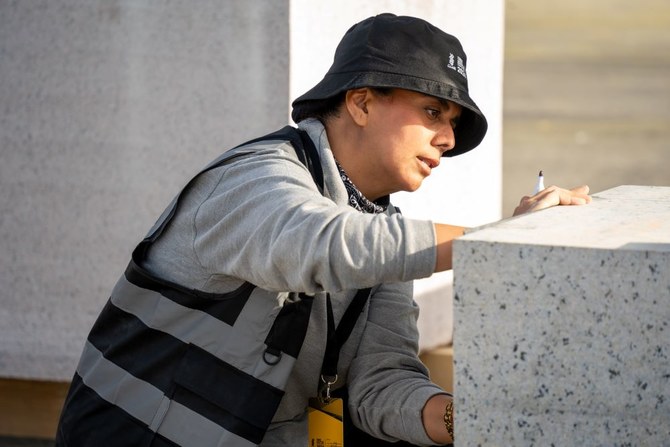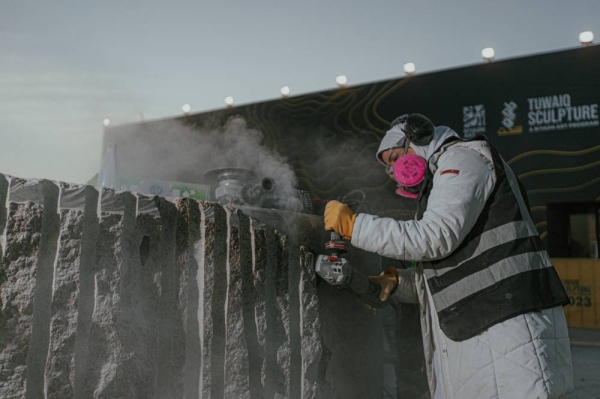
Held under the theme ‘Dimensions of Movement,’ symposium is spotlighting 30 artists from around the world
Lamia Moraished: ‘The symposium wasn’t just about contributing a piece, but it was also a global cultural experience’
RIYADH: In the past month, 30 artists from 20 countries carved and sculpted their way through raw stone. Now, the annual Tuwaiq Sculpture symposium has opened its doors to the public, displaying their large-scale public works until Feb. 24 just north of ROSHN Front.
Under the theme “Dimensions of Movement,” each artist explored the progress and expansion they all witnessed across the Kingdom, specifically Riyadh, in their own language. The symposium is led by Head Curator Marek Wolynski, and Associate Curator Fahad Al-Jebreen.
Wolynski told Arab News: “‘Dimensions of Movement’ pays tribute to how society can develop and integrate progress within daily life. I’m hoping that (it) captures a moment in time and serves as a point of reference for the generations to come.”
Once the sculptures are relocated to public spaces across the Kingdom’s capital, he hopes they will reflect the optimism, passion, and dynamism embedded within Saudi society.
The 30 artists not only carved raw granite into large-scale artworks, but also shared breakfasts and dinners, enjoyed cultural exchanges and Sunday excursions, demonstrating that Tuwaiq’s goal is to forge collaboration between artist communities around the world.
“It’s not only about the production of sculptures, it’s predominantly about the exchange of knowledge and transfer of skills that happens between artists themselves,” Wolynski said.
The program received an unprecedented 700 applications from 84 countries. After careful selection by the jury panel, 30 artists were selected from Saudi Arabia, China, India, Iran, through to the Arab world, Europe and South America, including Chile, Ecuador, Mexico, Canada, and others.
Spanish artist Jordi Raga has developed methodologies that combine constructive and subtractive techniques using manual and digital technologies. The work intends to behave as a sundial during the summer solstice.
Influenced by the notions of progress and evolution, Raga has centered two of Saudi Arabia’s most vibrant cities, Riyadh and Makkah, in his artwork titled “The Spark,” which combines techniques of manual and digital technologies. Using 3D software, he predicted a shadow that points from Riyadh to Makkah on June 21, reflecting the importance of will and hope as a driver of progress and evolution.
“The spark is the beginning of a chain reaction. So, all progress can create a revolution … I believe art is a catalyst as well,” Raga told Arab News.
The Spanish artist’s practice also champions sustainability. At Tuwaiq, he made a point to generate a spatial experience with minimal materials and waste.
The cohort features 10 Saudi artists, half of whom are women. Artist Azhar Saeed centered her work, titled “Extension,” around the Kingdom’s multitude of pioneering feats in various fields.
“It symbolizes an extension of past efforts, from the Kingdom’s foundation until now. The country is experiencing the largest construction renaissance in the modern Arab world, so we as Saudis are working quickly and ambitiously to cope with this change,” she told Arab News.
The five stone pieces, derived from the geometrical shape of honeycombs, are a nod to the essential component of cooperation between various projects under the Kingdom’s Vision 2030.
Saudi artist Lamia Moraished’s sculpture consists of horizontal columns resting on natural-textured stone pieces. The work intends to evoke a feeling of firmness and solidity even while in movement.
“The symposium wasn’t just about contributing a piece, but it was also a global cultural experience. We created friendships, exchanged knowledge and cultures, and learned about sculptural heritage in other countries as well,” she told Arab News.
The program also incorporates public engagement through ongoing workshops, panel discussions, masterclasses, and university and school visits. The program was designed to “allow for the community to embrace the transformation on different levels,” Wolynski said.
“This is very important, especially for children to see different models for things they can do in the future. If they see art, they can think maybe to become creators in multiple fields, so that’s already a catalyst,” Raga noted.











